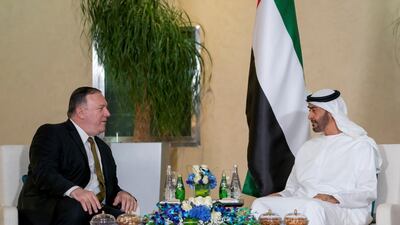US Secretary of State Mike Pompeo last night arrived in the UAE to discuss the creation of a coalition to confront Iran, as Washington announced new sanctions against Iranian groups and people.
On Monday evening, Mr Pompeo met Sheikh Mohamed bin Zayed, Crown Prince of Abu Dhabi and Deputy Supreme Commander of the UAE Armed Forces, to discuss regional and international developments.
They included the recent oil tanker and drone attacks that have posed a threats to regional stability and safety of international maritime navigation.
Sheikh Hazza bin Zayed, Deputy Chairman of the Abu Dhabi Executive Council, Sheikh Tahnoon bin Zayed, National Security Adviser, and Sheikh Abdullah bin Zayed, Minister of Foreign Affairs and International Co-operation, attended the meeting.
Also there were Khaldoon Al Mubarak, Chairman of Abu Dhabi Executive Affairs Authority, and Mohamed Al Mazrouei, the Undersecretary of the Abu Dhabi Crown Prince's Court.
Mr Pompeo’s visit to Abu Dhabi followed a meeting in Saudi Arabia with King Salman and came as US President Donald Trump called on consumers of oil from the Middle East to take greater responsibility for protecting shipping lanes such as the Strait of Hormuz.
Mr Trump on Monday called on importing nations such as China and Japan to take greater responsibility protecting shipping lanes.
In tweets, he specifically named China and Japan as key beneficiaries of the US policy, saying the US receives "zero compensation" for what has "always been a dangerous journey."
Mr Trump said the US "request for Iran is very simple: no nuclear weapons and no further sponsoring of terror".
The Strait of Hormuz is a vital shipping line allowing access to the Arabian Gulf and has been the centre of deteriorating relations with Iran since April.
During their meeting, Mr Pompeo and King Salman discussed the need to promote maritime security in the Strait of Hormuz," the shipping lane where six tankers have been attacked. Iran has been blamed for the attacks.
"Freedom of navigation is paramount," Mr Pompeo said in a tweet.
The US special envoy for Iran, Brian Hook, said that one plan could be to "enhance" an existing multinational maritime force in the region involving about 30 countries, which currently fights drug and arms smuggling, with options to be discussed at the Group of 20 summit in Japan this week.
Speaking as he left Washington for the Arabian Gulf, Mr Pompeo said he would talk with representatives in Jeddah and Abu Dhabi about how to “make sure that we are all strategically aligned”.
He said that he also wanted the coalition to stretch beyond the Gulf states, across Asia and to Europe.
Announcing sanctions against the office of the supreme leader of Iran, Ayatollah Ali Khamenei on Monday, Mr Pompeo said Iran "has engaged in 40 years of terror and aggression against the United States and our allies".
Eight republican guards officers were also blacklisted, with US Treasury Secretary Steven Mnuchin saying the US would also designate Iranian Foreign Minister Javad Zarif this week.
His trip was arranged hastily late last week in addition to a visit to India. Mr Pompeo called the UAE and Saudi Arabia “two great allies” in tackling the challenge that Iran presents.
Mr Hook said the US would lift sanctions against Tehran if there were a new nuclear deal, but said any deal must come first. Iran says it wants the sanctions lifted before it sits at the negotiating table.
Mr Hook said a deal would address Iran's nuclear programme, regional aggression and detention of dual nationals.
The Arabian Gulf in focus
Tensions have been rising between America and Iran after the downing of a US drone and six tanker attacks in the Gulf of Oman, for which Washington says Tehran is responsible, and a stalemate in discussions about US-imposed nuclear sanctions.
On Sunday, US President Donald Trump said he would impose major additional sanctions on Iran to prevent the country from obtaining nuclear weapons, after the last-minute recall of a military strike on Iran and a cyber attack against it.
These new sanctions will be countered by Russia and its partners, deputy foreign minister Sergei Ryabkov told state news agencies.

Russia is a signatory to the 2015 nuclear deal and criticised Mr Trump's 2018 decision to withdraw.
Saudi Minister of State for Foreign Affairs Adel Al Jubeir told Le Monde that Iran would "pay the price" if it "continues its aggressive policies".
Iran's response
On Monday, Iranian officials released statements seeking de-escalation, while warning of further actions if necessary.
Foreign Ministry spokesman Abbas Mousavi said the country would welcome the "defusion of tensions in the region", the Isna news agency reported.
One of the Iranian president's top advisers indicated Iran was open to a new deal with the US but said concessions beyond the 2015 nuclear deal would have to be met by the Americans.
"If the US want something beyond the JCPOA [nuclear deal], they should offer something beyond the JCPOA, with international guarantees," Hesameddin Ashena tweeted.
Iranian Telecommunications Minister Javad Jahromi denied that there had been a successful cyber attack against the country, despite admitting repeated attempts.
And an Iranian navy commander Rear Admiral Hossein Khanzadi warned that the "firm response" of shooting down the US drone could be repeated, and "the enemy knows it".
On Sunday, Mr Zarif tweeted a picture purportedly showing the movements of a US drone flight in late May.
Special relationship remains over Iran
UK Foreign Secretary Jeremy Hunt, one of two politicians in the running to be the next prime minister, has said Britain would consider joining the US in military action against Iran.
On Monday, Mr Hunt repeated his concern about the situation, warning of the danger of "an accidental war" and saying the UK was in close touch with the US.
"We have been doing everything we can to de-escalate the situation," he said.

